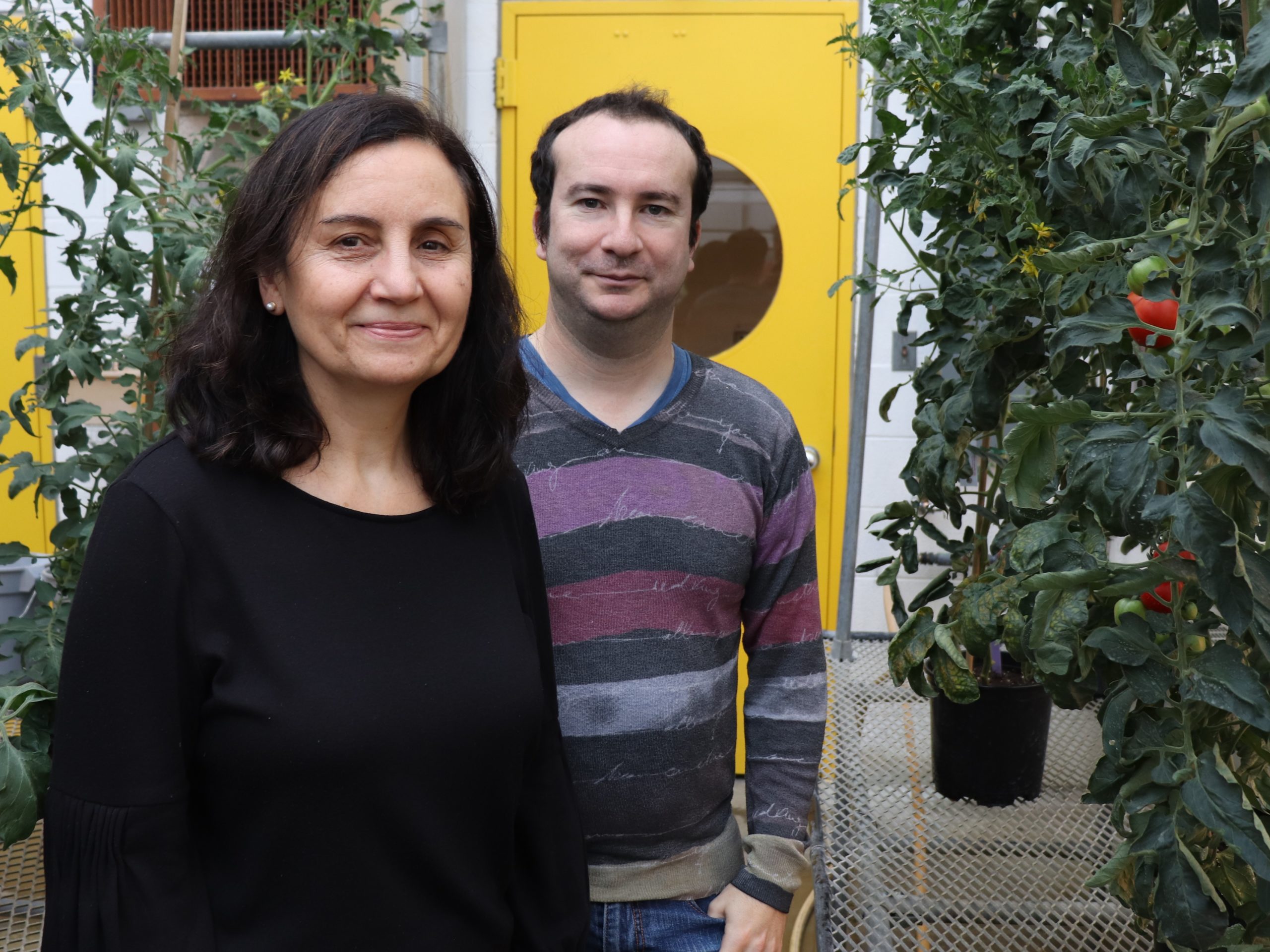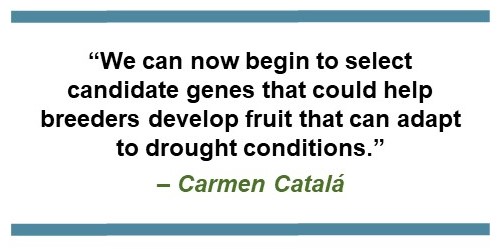Ithaca, New York, USA
November 30, 2022
 Carmen Catalá and Philippe Nicolas examine tomatoes in a BTI greenhouse. Image credit: BTI
Carmen Catalá and Philippe Nicolas examine tomatoes in a BTI greenhouse. Image credit: BTI
As climate change is expected to lead to more frequent periods of drought, researchers are increasingly working to make discoveries that can help plants adapt to prolonged water stress.
Researchers from Boyce Thompson Institute and Cornell University have completed the first study to provide a comprehensive picture of gene expression changes in response to water stress in a fruit – the tomato, Solanum lycopersicum – identifying genes that could help plant breeders develop fruit that can cope with drought conditions.
Published in the December issue of Plant Physiology, the work was led by the research team of Carmen Catalá, an assistant professor at BTI and a Senior Research Associate in the School of Integrative Plant Science (SIPS) at Cornell. Collaborating researchers include Jocelyn Rose, a professor in SIPS, and BTI professors Jim Giovannoni, Zhangjun Fei and Lukas Mueller, who are also adjunct professors in SIPS.
First author is Philippe Nicolas, a postdoctoral researcher in Catalá’s lab.
“We identified a number of genes that are involved in water stress response in the tomato fruit,” said Catalá. “We can now begin to select candidate genes that could help breeders develop fruit that can adapt to drought conditions, and not just tomatoes but also grapes, apples, and fleshy fruit in general. That is a long-term potential application of these data.”
The researchers looked at gene expression in tomato leaves and six fruit organs (pericarp, placenta, septum, columella, jelly and seeds) at two different timepoints (growing and ripe fruit) and under four different water stress conditions (none, mild, intermediate and strong).
The researchers found that each of the fruit organ tissues changed in unique ways over time.
“Less than 1% of the expressed genes that were affected by water stress were shared among all six fruit tissues, and more than 50% of the affected genes were specific to a single tissue,” said Catalá.
In contrast to the negative effects of drought, which triggers physiological disorders and fruit loss, there are some positive effects associated with drought – at least with mild drought.
For example, the researchers found that water stress increases the amount of lycopene in ripe fruit. Lycopene is an antioxidant that has documented health benefits. Water-stressed fruit also had higher levels of starch biosynthesis, which could yield sweeter tomatoes.
 The researchers also found that they could “train” tomatoes to be more resistant to future water droughts.
The researchers also found that they could “train” tomatoes to be more resistant to future water droughts.
“When we sowed the seeds from treated plants, we found that the seedlings from stressed tomatoes showed improved recovery from water stress in comparison to seedlings from control tomatoes,” said Nicolas.
Nicolas said they identified several genes whose expression is induced by water stress in mature seeds, which could play important roles in conferring water stress tolerance to the next generation of plants.
The study was challenging in a few ways because the researchers were looking at fruit. Most studies of plant responses to drought stress examine seedling roots and leaves because they are relatively easy to study.
“It is relatively easy to stress seedlings, but if you stress plants too much then they won’t flower and develop fruit,” Catalá said. “Plus, when you want to study fruit, you must grow adult plants, which takes more time, room and overall resources.”
The project was supported by grants from the National Science Foundation (IOS-1339287), and the U.S. Department of Agriculture (59-8062-9-003P, 2020-03667, and 2019-67013-29240).